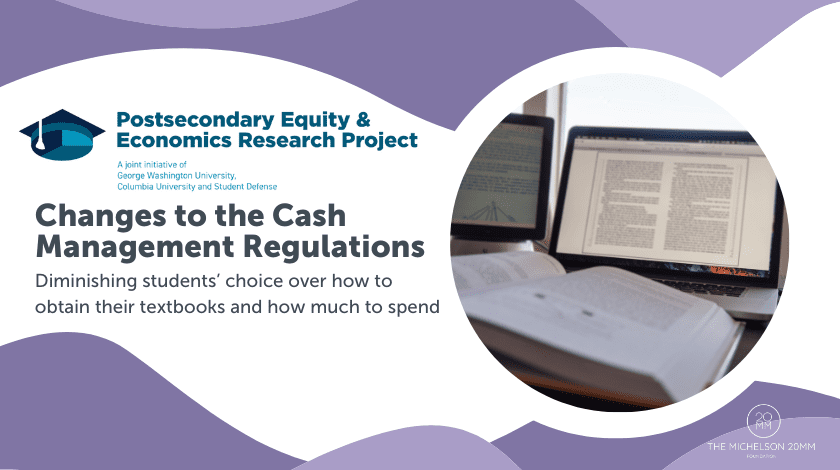By Cailyn Nagle
A 2022 Bayview Analytics report showed that automatic textbook billing has risen to 19% since the practice was made possible in 2016. This “new” way of delivering educational materials—often referred to as inclusive access, first day access, or equitable access— is when institutions or educators sign bulk purchasing agreements with publishers or booksellers to automatically add a fee for course materials to a student’s account, a practice made possible by changes to the U.S. Department of Education’s cash management ruling. Prior to 2016, students were required to opt into fees for their course materials ;changes to this rule, however, allowed for these materials to be automatically billed to student accounts if the materials were priced under “competitive market rates.”
The Michelson 20MM Foundation is proud to have funded a new legal white paper from the National Student Legal Defense Network (Student Defense), published through its Postsecondary Equity & Economics Research (“PEER”) project, which investigates whether the impact of the 2016 rule changes were aligned with existing legislation and the Department’s goals. Specifically, Student Defense examined whether automatic textbook billing increases student choice, promotes price transparency, and protects competition within the textbook marketplace. The findings? No, automatic textbook billing does not fulfill the spirit of existing legislation. There is still time to protect students with common sense guardrails that would move inclusive access agreements closer to the spirit of the law.
Student Defense was created in 2017 to fight for increased student and consumer protections across higher education. Student Defense has leveraged its expertise in consumer protection, higher education law and policy, civil rights, and litigation to win lawsuits aiming to protect student borrowers from predatory practices, to establish a right to automatic debt relief for borrowers with certain permanent disabilities, to make government more transparent, and, more generally, to promote policies that ensure that higher education promotes equity and remains a launching point for social and economic mobility.
In their report Changes to the Cash Management Regulations: Diminishing Students’ Choice Over How to Obtain Their Textbooks and How Much to Spend, Student Defense lays out legislative and regulatory changes that would restore some of the competition and transparency to the market including:
- Defining “below competitive market rates” in Cash Management regulations;
- Requiring schools to disclose to students their textbook pricing and discount methodology as well as alternative, affordable resources; and
- Ensuring students have access to homework and courseware separated from their required textbooks.
Since 2019, Michelson 20MM has supported initiatives that build transparency around the practice of automatically billing students for textbooks. Past projects have included Spark Grants that created original research around these types of contracts and resources for students and educators who interact with these models. As the Department of Education signals that they are looking into feedback around the cash management rule, this newest entry into the growing body of work pushing back on publisher narratives could not be better timed.
Michelson 20MM is a private, nonprofit foundation seeking to accelerate progress towards a more just world through grantmaking, operating programs, and impact investing. Co-chaired and funded by Alya and Gary Michelson, Michelson 20MM is part of the Michelson Philanthropies network of foundations.
To sign up for our newsletter, click here.
